The Price Of Glee In China
post by Scott Alexander (Yvain) · 2016-03-24T00:12:28.000Z · LW · GW · 1 commentsContents
I. II. None 1 comment
[Epistemic status: Overly simplistic treatment of a horrifyingly complex topic; I can only hope I haven’t missed enough to completely embarrass myself]
I.
Noah Smith reviews recent economic research suggesting that globalization was a net harm to working class people in rich countries like the US; he tentatively suggests this could justify a weak form of protectionism. But Scott Sumner argues that’s the wrong way to look at things. Globalization fueled China’s transition from a poor agrarian economy to an industrialized modern nation. A billion people were lifted out of poverty, an accomplishment Sumner calls “the best thing that ever happened”. This is far more important than the less dramatic costs imposed on the US. Therefore, even if we agree globalization hurts the working class of rich nations, it’s still a morally defensible policy since it benefits the needier working classes of much poorer nations.
On the one hand, this makes sense. On the other, here’s happiness in China over the past fifteen years:
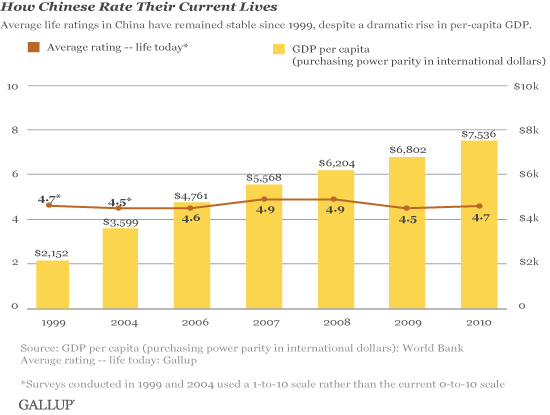
Measuring happiness is really hard, but the Chinese result seems as robust as any. You get the same thing if you ask about satisfaction versus dissatisfaction. Brookings analyzes five different series of happiness data and concludes that “the Chinese became less happy during their growth boom”. The New York Times agrees and says that “Chinese people’s feelings of well-being have declined in [this] period of momentous improvement in their economic lives”. And this seems to be worst among the poorest Chinese:
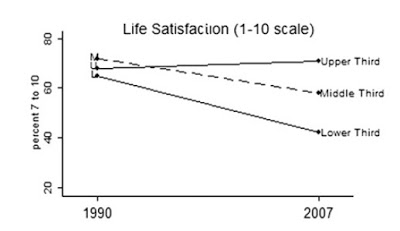
Nor does this seem to be an effect from our happiness research just not being good enough to capture changes in happiness even if they occur. There’s good evidence that increased income within a country increases happiness, and various other things have been found to be effective too. I would even argue we can find happiness changes in nations – recent surveys have found Iraq and Syria to be the least happy nations in the world, and I doubt this was true before those countries’ respective wars. It seems to just be national GDP per capita that doesn’t do anything.
This is Easterlin’s Paradox, the observation that a country in general does not get happier as it becomes richer. This is very controversial, with statisticians analyzing and reanalyzing data and crunching it a bunch of different ways. In the latest volley in this eternal war, Easterlin’s side came out with data from 37 countries over 30 years, including many countries that underwent spectacular growth during that time, and confirmed their original conclusion.
There are certainly graphs like this one that propose a nice clear log relationship between income and happiness:
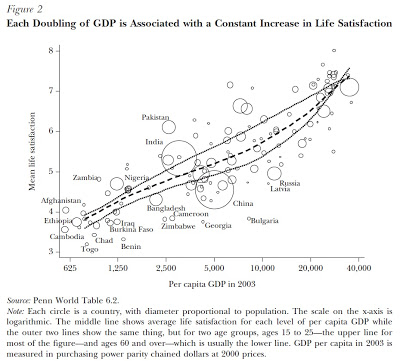
But I find the exact breakdown much more interesting:
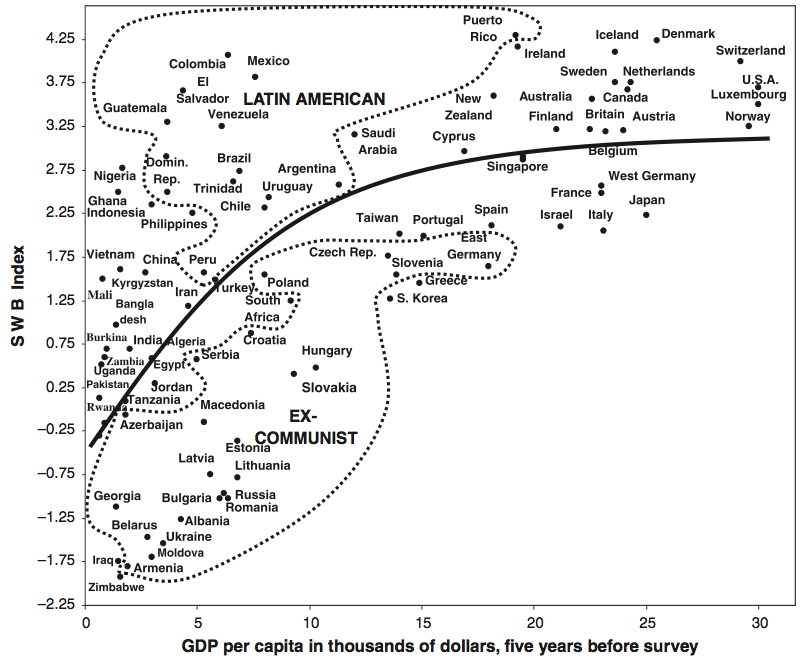
Here we see a lot of cultural variation in this apparent happiness-income relationship. For example, Latin American countries are consistently poor but happy; Eastern European countries are usually richer but sadder than African countries, et cetera. Looking at the original graph above, you’d expect Chinese growth to make them much happier; looking at this graph, you notice that China’s three rich neighbors – Japan, Taiwan, and South Korea – are all about as happy as China. South Korea, despite making five times more money, is less happy than China is. If China’s income quintuples, why would you expect it to look like France or Ireland rather than South Korea?
Just to rub this in a little:
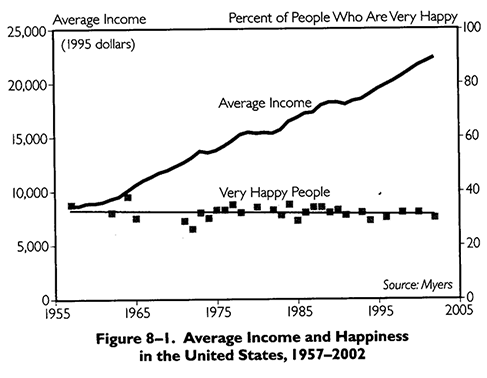
A UN report theorizes that although richer countries tend to be happier, this is more likely due to factors other than income, like freedom, social trust, and stable families. These may be stable on scales much longer than income is, and may be related to culture.
II.
Let’s assume for a second that all this is true. National income does not matter for national happiness, and if China’s growth continues to skyrocket then in twenty years it will be as rich as Japan but not an iota happier than it is today. What do we do with this kind of knowledge?
Or let me ask a more specific question. Suppose that some free trade pact will increase US unemployment by 1%, but also accelerate the development of some undeveloped foreign country like India into hyper-speed. In twenty years, India’s GDP per capita will go from $1,500/year to $10,000/year. The only cost will be a million or so extra unemployed Americans, plus all that coal that the newly vibrant India is burning probably won’t be very good for the fight against global warming.
Part of me wants to argue that obviously we should sign the trade pact; as utilitarians we should agree with Sumner that lifting 1.4 billion Chinese out of poverty was “the best thing that ever happened” and so lifting 1.2 billion Indians out of poverty would be the second-best thing that ever happened, far more important than any possible risks. But if Easterlin is right, those Indians won’t be any happier, the utility gain will be nil, and all we will have done is worsened global warming and kicked a million Americans out of work for no reason (and they will definitely be unhappy).
Or since most of us don’t get the option to sign trade pacts, here’s a more relevant question. Suppose we are effective altruists. We have the opportunity to cure disease (at relatively high costs) or boost national development (at relatively low costs). Assume the numbers work out such that if we took a simple ‘development = good’ perspective, then donating to the development charity would be a no-brainer. Should we donate to the disease-cure charity anyway?
A couple of years ago, I learned that people who were paralyzed in car accidents took a few months to adjust to their new situation, but after that were no less happy than people who were still healthy and abled. Then last December I learned that this was an urban legend, that people who were paralyzed in car accidents were mostly as miserable as you would expect. But for those few years while I still believed that particular factoid, I was a little creeped out. Was a doctor who helps car accident victims recover their function wasting her life? If people got genuine enjoyment from driving drunk at 95 mph while shouting “WOOOOOOOOOOOOO!”, was there any reason to make them stop, since they weren’t really hurting anybody?
(I admit I’m skipping over factors like how paralyzed people can’t earn any income to pay into the tax system and stuff, but I’m just saying I would be pretty creeped out if that were the only reason we should avoid car accidents.)
Again assuming I haven’t made some simple calculation mistake, I can think of three ways to go from here. First, abandon consequentialism entirely (I understand that having children will likely decrease my happiness, but I still want to have children because I value them for non-utilitarian reasons). Second, switch to a consequentialism based on non-subjective things like maximizing development and industrialization as a terminal goal (Really? Even if everyone hates it? Does it matter what the factories are building? How about paper clips?). Third, switch to preference utilitarianism.
Preference utilitarianism is tempting and I was kind of in favor of it already, but I don’t find it completely satisfying. Suppose I myself am an Indian peasant. Should I have a preference for my society industrializing? If I’m not going to be any happier after it does, and supposing there’s no inherent moral value in industrialization, why bother? And if Indian peasants want their country to industrialize anyway, aren’t we as Americans allowed to say we don’t take their preference that seriously? If some hippie said they wanted to go on some Spiritual Yoga Nature Retreat that would turn their life around and bring them constant bliss, but we knew it was a complete fraud that wouldn’t help them at all, would we still feel a moral obligation to help fund that hippie’s retreat? How are the two situations different?
There’s a risk of being patronizing here – telling the Indians “Oh, you don’t need to industrialize, it’s not so great anyway,” even while we ourselves enjoy our nice food and flat-screen TVs. If we were to actively try to keep the Indians from industrializing, that would be pretty awful. But that’s not the argument at hand here. The argument at hand is “are we morally required to sacrifice our own economy in order to help the Indians industrialize?”, and I feel like that’s a hard sell if industrialization doesn’t really help the Indians.
And there’s also a risk that I might be misdefining happiness. Maybe every way economists have hitherto measured happiness is hopelessly deficient, and there’s some ineffable essence of happiness which, if we could get at it, would increase during national development. I admit that all of these subjective well-being indices are kind of sketchy and change a lot with the wording that you use or don’t use.
A final option for rescuing common sense might be acknowledging that economic progress doesn’t change happiness yet. That is, there are ways to convert economic (and closely linked technological) progress into happiness, but most countries are not making use of them – either for political reasons, or because they don’t know about them, or because we haven’t gotten enough technological and economic progress to reach them yet. This seems probably true to me – if nothing else, a technological singularity ought to help – but this situation looks a lot different from the situation where incremental progress increases happiness. In particular, it would make us want to concentrate our resources on increasing technological progress, perhaps in the richest economies, rather than trying to help poor countries in particular.
None of these possibilities really appeal to me, and I am forced to acknowledge that happiness research remains a very strange field whose conclusions make no sense to me and which tempt me to crazy beliefs and actions if I take them seriously.
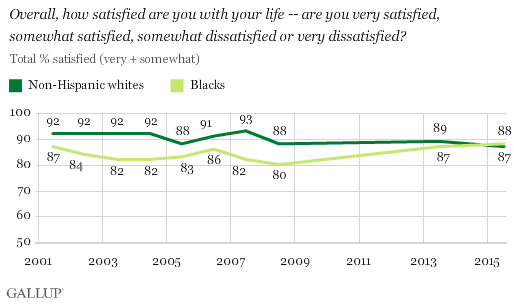
I guess we’re done fighting racism. Good job, guys.
1 comments
Comments sorted by top scores.
comment by Andrew Vlahos (andrew-vlahos) · 2021-02-27T18:41:53.369Z · LW(p) · GW(p)
The problem is that crushing poverty is one source of misery, but not the only source of misery. This implies that very poor countries would have clear benefits from industrializing, but things like cultural pressures and instability also have an effect, so when resources are common other factors dominate and so additional industry doesn't affect things much.